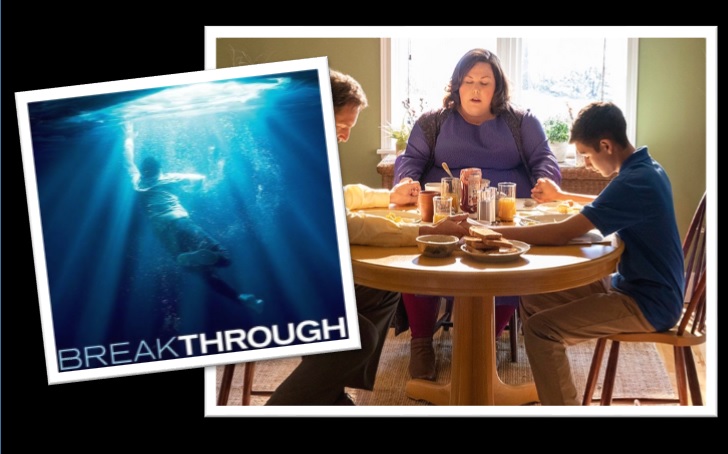
Tom Krattenmaker,
Oregon writer, USA TODAY contributor and Yale Divinity School communications director.
The new movie “Breakthrough” tells an inspiring, real-life story about a boy rescued from death by his mom’s prayers and a medical miracle. Producer DeVon Franklin calls it the kind of unifying balm the country needs in these hostile, divided times. Only black-hearted atheists and curmudgeons could have a problem with this wholesome, uplifting film, right?
Not so fast. Countless believers who have lost loved ones despite their earnest faith might have a bone to pick. So might citizens bothered by a current in popular religious culture that invokes God in illogical, “me”-oriented ways that trivialize faith and skirt the hard questions.
Not swooning over “Breakthrough”? Me neither.
Sure, the movie has qualities that deserve acknowledgement. Faith-based movies can no longer be counted on to deliver poor production and worse acting. This movie suffers from neither — and delivers quite the opposite at times.
Nor is its box-office appeal limited to conservative Christian America, as used to be the case with movies emphasizing God and prayer. “Breakthrough” was third in ticket salesover its opening weekend with $11.1 million, bested by only “The Curse of La Llorona” and “Shazam!”
Key to any cultural production is a good story, of course, and “Breakthrough” is richly endowed. The movie recounts the real-life drama of a Missouri teenager, John Smith, who was messing around on a frozen lake with two friends in 2015 when the ice broke, plunging the boys into the frigid water. The friends got out quickly but not John. Submerged for 15 minutes before rescue workers could pull him out, he was essentially dead by the time he arrived at the hospital.
All hope seemed lost. But not to his mother (played by “This Is Us” star Chrissy Metz), who in the movie starts praying fervently and hollers at the Holy Spirit to breathe life back into her son. John’s pulse returns, the first step toward a complete recovery that defies all medical explanation.
Patients can recover for unexplainable reasons
Whatever you think of miracles, stories like this are nothing to snark about. Despite my skepticism, I am glad John Smith recovered, and I praise the mother for her devotion to her son. By the same token, when religious friends tell me about mystical experiences they’ve had, what am I to do? Tell them they did not have that experience?
Such conversations require humility. As does grappling with the reality that every now and then patients recover from terminal injuries and illnesses. Is it because of prayer and divine intervention? Good luck? The amazing and not-fully-understood healing capacities of the human body?
“Yes, miracles happen. We do see them in medicine. But we doctors don’t like to talk about them because we can’t explain or prove them,” Lydia Dugdale, a Yale professor of medicine who has a master’s degree in ethics from Yale Divinity School, told me.
“Having said that, I think the church, broadly considered, does a bad job of framing illness, death, and healing,” added Dugdale, editor of a book called “Dying in the Twenty-First Century.” “The Orthodox philosopher Jean-Claude Larchet says that when faced with illness, we should ask not for a return to health, but for that which is spiritually most useful. Perhaps sometimes it’s spiritually useful to raise the dead. But that’s no guarantee that God will do so every time.”
God either works in mysterious ways, or not
No guarantee at all, which is why I wish this movie, and over-the-top God promoters in general, would temper their claims about the wondrous and miraculous with a little more thoughtfulness.
For instance, if you pay attention to the God-talk around natural disasters, including recent tornadoes in Alabama and Louisiana, you’ll hear grateful claims, made with absolute certainty, that God spared my house or that family.
As for the neighbors who lost their homes and maybe their lives — or why God created or allowed the killer storm in the first place — it’s typically said that God works in mysterious ways. Fair enough. But be consistent! There should be a rule that if you invoke God’s mysteriousness when a kid gets cancer or a family’s home is incinerated by a wildfire, you can’t say for sure what God was up to when there’s been a stroke of good fortune. Enough with the insinuations that God favors some over others or, worse, “Here’s proof of God’s existence!”
No grappling with divine capriciousness
During a brief scene near the end of “Breakthrough,” it appears the movie is going to grapple with this apparent capriciousness of the divine. John is back at school, and his teacher approaches him after class: How does he account for God saving him but not her husband, who died of an aneurysm two years prior?
As if to admonish those with the temerity to raise such questions, the script has the teacher catch herself, suddenly embarrassed, and say, essentially, “never mind.” The boy shoots out of the classroom and the scene ends, no answers.
What “Breakthrough” does reveal — and it might be the movie’s most redeeming quality— is the team effort that goes into saving a life and sustaining a good community. Demonstrating how “God helps those who help themselves,” as the old aphorism goes, the film showcases the conscientious work of the rescue team and hospital personnel and the loving support of the Smith family’s church and school communities.
The power of community, the power of love — now there’s something that can inspire and unite all of us.
Tom Krattenmaker, a member of USA TODAY’s Board of Contributors and director of communications at Yale Divinity School, is the author of “Confessions of a Secular Jesus Follower.” Follow him on Twitter: @TKrattenmaker
Disclaimer: Articles featured on Oregon Report are the creation, responsibility and opinion of the authoring individual or organization which is featured at the top of every article.

